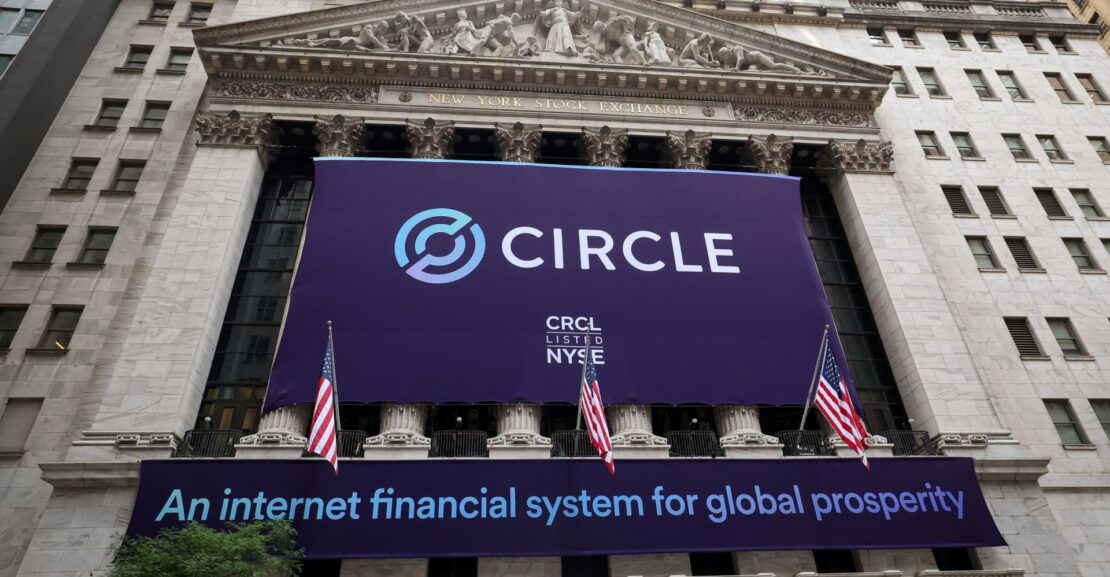Circle Internet Group, the issuer of one of the world’s biggest stablecoins, priced its initial public offering at $31 per share late Wednesday. That’s above the expected range of $27 to $28 and gives the company a total market value of $6.8 billion.
New York-based Circle, its founder and some original shareholders will raise $1.05 billion in the offering of 34 million shares. In a measure of enormous demand for the crypto company, Circle increased the number of shares sold in the IPO from 32 million after the market closed Wednesday. Originally, Circle had sought to raise just $624 million by selling 24 million shares in a range of $24 to $26 per share.
Circle granted its underwriters, led by JPMorgan, Citigroup and Goldman Sachs, a 30-day option to sell an additional 5.1 million shares. Circle stock will trade on the New York Stock Exchange under ticker symbol “CRCL.”
Cathie Wood’s ARK Investment Management has indicated interest in purchasing up to $150 million of the shares, according to a Securities and Exchange Commission filing.
Circle, led by CEO Jeremy Allaire, is one of the earliest companies in the crypto industry and the issuer of USD Coin, commonly referred to by its ticker, USDC. It’s the second largest stablecoin in the world, comprising 27% of the market, behind Tether’s USDT, which dominates 67% of the stablecoin market.
Headquartered in Boston until early this year, Circle earned $156 million in net income in 2024 on $1.68 billion in revenue and reserve income, down from income of $268 million on $1.45 billion in revenue in 2023.
The tech IPO market has shown signs of life this quarter after an extended drought dating back to early 2022. Investors are watching new offerings as tests of the market’s readiness for new offerings.
Brokerage platform eToro filed in March to go public this year, joining Klarna and Stubhub. At the time, IPOs looked set to benefit from President Trump’s return to the White House, but all three companies ended up shelving those initial plans as tariff developments soon rocked the capital markets.
Since finally debuting last month, EToro is up 25%, while shares of artificial intelligence infrastructure provider CoreWeave have more than doubled since the company’s March IPO. In the past month, digital health company Omada Health and fintech company Chime have also filed to go public.
Circle will become one of the most prominent pure play crypto companies to list in the U.S. Unlike eToro, Robinhood, Block, or even Strategy, Circle’s entire business is stablecoins – cryptocurrencies that are backed by another asset, usually the dollar. The tokens are designed to bring the stability of traditional currencies to blockchain networks, whose speed and efficiency in transferring money has become attractive to global financial institutions.
Stablecoins are also widely regarded as crypto’s killer app. Historically, Stablecoins’ main function was in trading but now companies that are outside the traditional crypto universe are eyeing what JMP Citizens calls a post regulatory land grab that could see exponential growth to $3 trillion in the next five years.
Stablecoin momentum is exploding this year, thanks to new interest from banks and payment firms as the Trump administration rolls back restrictive Biden-era crypto policies and Congress makes progress on passing stablecoin legislation, possibly as early as August.
Circle’s USDC coin is likely to be favored by institutions largely because of Circle’s emphasis on regulatory compliance. The company was the first to receive a New York State BitLicense, which is famously difficult to obtain, in 2015. As banks, payments companies and financial technology firms eye a move into stablecoins, that commitment to compliance may serve as an advantage for Circle.
—CNBC’s Nick Wells contributed reporting.

